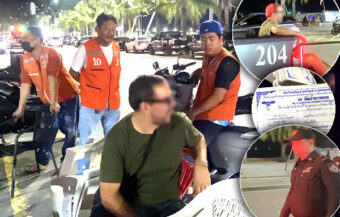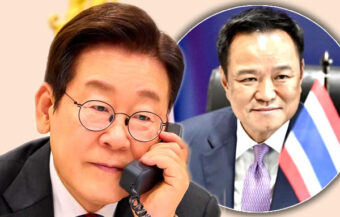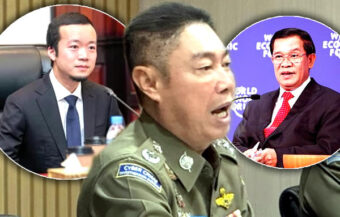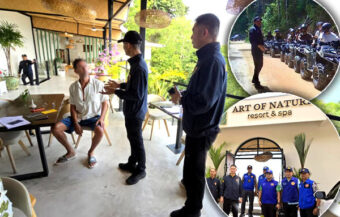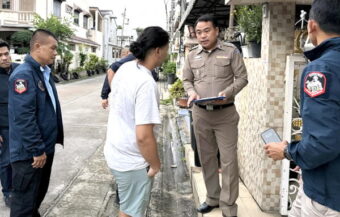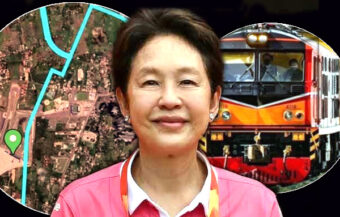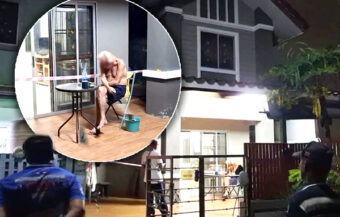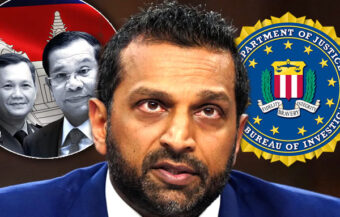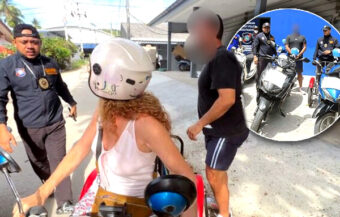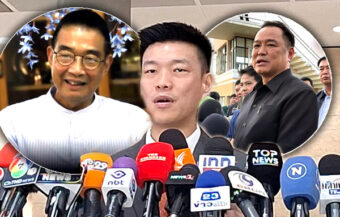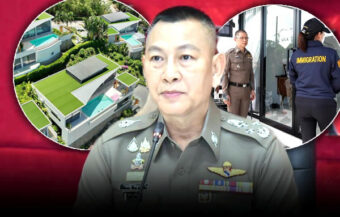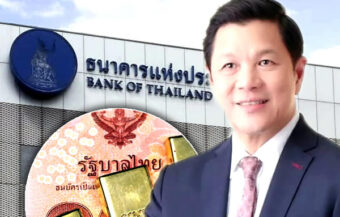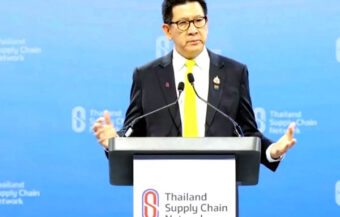PM Paetongtarn’s constitutional reform bid collapses as Bhumjaithai blocks votes, deepening coalition rift. With walkouts, land scandals and legal hurdles, Thailand’s government is in turmoil as growing rivals battle for control. Can the PM regain momentum?
Thailand’s government this week was at loggerheads both above and below the public’s view. The latest political but increasingly fierce struggle between the Bhumjaithai Party and the Pheu Thai Party has stalled any prospect of Constitutional Court change. On Saturday, Prime Minister’s Office Minister Chusak Sirinil confirmed that the government would seek clarification from the Constitutional Court through Parliament on the issue. At length, this followed two days of discussion in Parliament, where the junior coalition Bhumjaithai Party refused to cooperate and collapsed both sittings without a quorum. The week’s events saw a meeting between Bhumjaithai Party leader Anutin Charnvirakul and Prime Minister Paetongtarn Shinawatra at Government House, where other differences between the parties were also believed to have been aired.
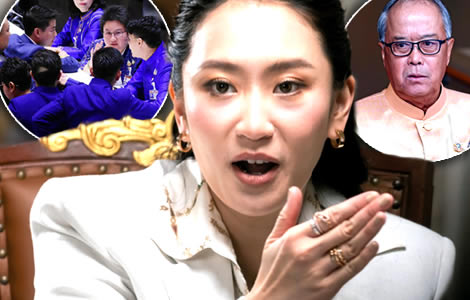
This week Deputy Prime Minister Anutin Charnvirakul took a walk from the Interior Ministry headquarters to the Thai-Khu-Fah building. Inside, he had a meeting with Prime Minister Paetongtarn Shinawatra.
Afterwards, he emerged and answered media questions. The main focus was on reports that land in the Pak Chong District of Nakhon Ratchasima owned by his family may have an illegal title.
Land disputes intensify as rival political factions clash over ownership and legal status of key properties
At length, Deputy Prime Minister Anutin insisted to reporters that while he was not concerned, the questioning of his family’s title was political. Indeed, it was not just 100% political, but 500 million per cent political. The land is linked to a golf course.
In brief, it comes as land in Pathum Thani linked to another golf course owned by the Shinawatra family is presently in the process of having its ownership rights revoked.
Similarly, Thailand’s Land Department, controlled by the Ministry of the Interior, is involved in a dispute in Buriram. This is the 5,083-rai plot in Buriram’s Khao Kradong area.
Significantly, 179 rai of that land is linked to substantial holdings held by the Chidchob family, the backers and funders of the Bhumjaithai Party.
A dispute between the Land Department and the Minister of Transport over this land is ongoing.
Basically, this is the underground battle between the Bhumjaithai Party and the ruling Pheu Thai Party. However, the main political battle is linked with constitutional change. Public support for the Bhumjaithai Party was only 2.99% in the last General Election. Nonetheless, it emerged with 55 seats due to the local influence of Big House politics.
In addition, it came from nowhere to secure at least 140 of the 250 seats in the Thai Senate. Indeed, many consider that number to be higher.
Bhumjaithai’s influence grows despite low electoral support as political tensions over reform escalate
After that, there was evidence in this month’s local elections that public support for the party is growing. Certainly, it is emerging as the rallying point for Southern discontent at Pheu Thai in the same way the Democrat Party used to do.
Undoubtedly, constitutional change is essential for Thailand. In brief, the 2017 constitution imposes overlapping oversight and restrictions on cabinet ministers. The nature of the constitution weakens political power and decisive governance in the kingdom.
For instance, at a northern rally in November 2024, Thaksin referred to the oversight environment as “shitty laws” which are stifling the progress of the country. In January, he suggested that the laws and the constitution were primarily designed to prevent someone like him from governing again.
Therefore, the Pheu Thai Party and the opposition People’s Party are committed to overhauling the charter.
However, things were made even more difficult by a Constitutional Court ruling in March 2021. In particular, the court ruled on March 4th, 2021, number 4/1564, that any attempt to amend the constitution must first pass a referendum. After that, the court ruled that a second referendum was required to approve the new constitution.
However, in the quagmire of political debate in parliament, it is now being suggested that three referendums are required to alter the constitution.
Despite this, both the ruling party and the opposition rely on the charter’s text and have suggested that the process can begin in parliament.
Constitutional reform remains deadlocked as new legal obstacles emerge in the fight for political power
Suffice to say, it is nothing short of a mess. Another rabbit’s hole that invariably develops in Thai political struggles. Certainly, both the Bhumjaithai Party and Pheu Thai Party leaders maintain the fiction of a united cabinet. But here too, there are signs of conflict.
For instance, the slow reaction of the Ministry of the Interior in relation to cutting off electricity in Myanmar. Subsequently, the flight of scammer gangs shows it was effective. In contrast to the public utterances of unity, there is increasing evidence of a government at war within.
Furthermore, what has contributed to the government’s indecision is dealing with the need for constitutional change. Prime Minister Paetongtarn Shinawatra has pussyfooted around the problem. In short, the ruling Pheu Thai Party is being outmanoeuvred by the Bhumjaithai Party, which is indirectly supported by more conservative parties.
For instance, what are thought to be Bhumjaithai allies in the senate have insisted that any referendum be passed by a supermajority. In effect, this would require that more than half of eligible voters approve any referendum decision.
In particular, the move prevented the government from holding a constitutional referendum this month. This was previously to happen at the same time as the local elections.
Government struggles to maintain unity as internal conflicts threaten legislative agenda and reforms
Therefore, Prime Minister Paetongtarn Shinawatra pushed ahead this week with parliamentary efforts to amend the charter. The government failed.
At length, on both Thursday and Friday, February 13th and 14th, Bhumjaithai Party MPs and Senators walked out. At the same time, even if a vote was held, it was rumoured that 67 members of the Senate alone might be required to approve any proposed measure.
The Bhumjaithai Party made it clear that it believed the debate and process were unconstitutional. Certainly, this was based on the March 2021 court ruling.
In the end, the whole effort came to nothing. There was no quorum. Prime Minister Paetongtarn Shinawatra, attending a seminar in Bangkok on Friday, refused to comment. She ignored reporters before departing for Government House.
Parliamentary vote on constitutional reform collapses as Bhumjaithai blocks progress and walks out
On Saturday, Prime Minister’s Office Minister Chusak Sirinil, who is particularly concerned with the issue, took a different tack. At length, the government would ask the President of the Parliament, Mr. Wan Muhammad Noor Matha, to request clarification from the Constitutional Court.
In the meantime, the Pheu Thai Party is left running a government which is facing a growing number of oversight complaints. At length, the nature of the Constitution and oversight provisions allow regular government critics to lodge calls for review against either Ms. Paetongtarn or her party.
Consequently, the government must tread carefully. Presently, it is increasingly unlikely that the 2017 Constitution will be altered in the term of this government and parliament. In short, the legacy of the 2014 coup d’état and the most significant achievement of former Prime Minister General Pray remains in place.
Earlier on Thursday, the 37-year-old PM made her frustration clear.
“This is the parliamentary mechanism. MPs and senators can have different opinions, and when the two houses disagree, this is the result,” she said.
Pheu Thai faces mounting oversight as prospects for constitutional change dim under political pressure
During the campaign in the run-up to February local polls, Pheu Thai Party’s de facto leader Thaksin Shinawatra and, in effect, the leader of the present government was in his element.
Across the North of Thailand, he re-energized the Pheu Thai Party support base. Mr. Thaksin was seen as possibly helping to create a single-party government again. An alternative also mentioned was a Pheu Thai People’s Party coalition.
However, after the local election results, while his party did very well, the real winner was the Bhumjaithai Party. The Blue party is emerging as a power despite its low public support base in the last election.
Certainly, Mr. Thaksin has already accepted this.
Parliamentary vote on constitutional reform is questioned, court says referendum may be needed
Pheu Thai and Bhumjaithai rift is real and widening despite the latest attempt to soothe concerns among the public
“We don’t want to be a single-party government anymore. A bird without feathers, a person without friends – that’s not good. We need allies, just not too many to avoid headaches,” he said notably this week. Mr. Thaksin is a man who quickly recognizes change and altered circumstances.
What happens next in Thailand’s labyrinthine political equation is, as always, difficult to predict.
Join the Thai News forum, follow Thai Examiner on Facebook here
Receive all our stories as they come out on Telegram here
Follow Thai Examiner here
Further reading:
Thaksin’s rapturous welcome in Ubon Ratchathani as he puts in another vintage performance on stage
Anti-coup bill to be withdrawn as opposition grows from conservative parties within the government
South Korean tourist taken from Bangkok nightlife centre, tortured, murdered and buried in a bin
Fear-mongering, fake news and disinformation being stoked in China against visiting Thailand
Chinese tourists arrested on kidnapping and extortion charges insist they are innocent

